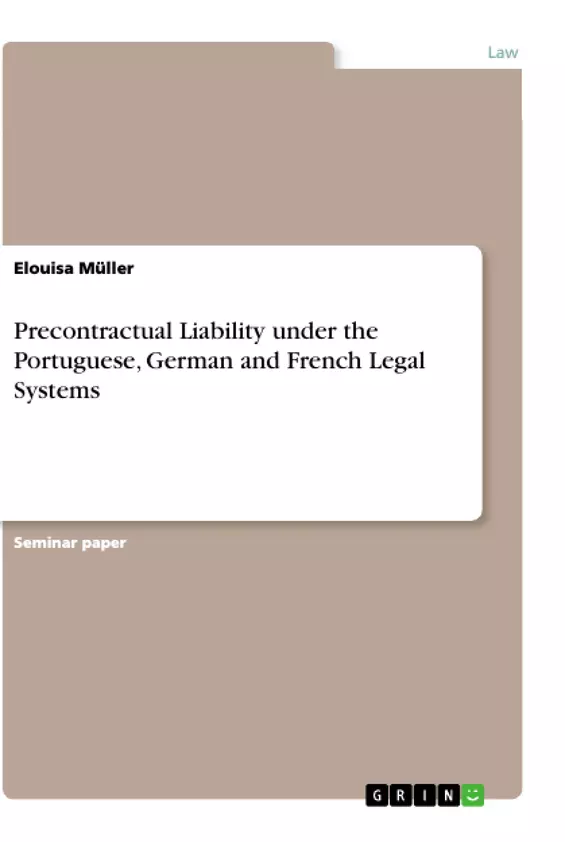On a daily basis, contracts are concluded between natural or legal persons. Therefore, many legal subjects have to enter into the precontractual phase of negotiations that eventually lead to a conclusion or a failure of the treaty. As first outlined by Jhering in 18611, the precontractual phase can establish a legal relationship in which precontractual obligations have to be respected.
In the following, the precontractual liability under the German, French and Portuguese law will be compared.
After an analysis of the historical origin of the precontractual liability in general and the presentation of the historical developments in Germany, France and Portugal, the legal problem, that needs a regulation in the legal orders, will be defined. Furthermore, in the com-parison of the regulatory framework, the similarities and differences of the current legislations in the three states will be examined based on various criteria such as the legal basis, the concrete precontractual duties and the relevance of the good faith.
Apart from comparing compensable damages, the legal institutes in those states will be classified. Before summing up the compar-ison of the roots and the legal institute by also including a grid of the main comparative aspects, important cases will be presented to understand the development of the precontractual liability in Germany, France and Portugal.
Inhaltsverzeichnis (Table of Contents)
- Introduction
- Comparative Analysis
- Historical Origin
- Historical Developments
- Germany
- France
- Portugal
- Definition of the Legal Problem that the National Legal Orders Need to Solve
Zielsetzung und Themenschwerpunkte (Objectives and Key Themes)
This work provides a comparative analysis of precontractual liability under the Portuguese, German, and French legal systems. It explores the historical development of this concept in each jurisdiction and aims to identify the similarities and differences in their respective legal frameworks.
- Historical origins of precontractual liability
- Comparative analysis of legal frameworks in Germany, France, and Portugal
- Key precontractual duties and their legal basis
- Role of good faith in precontractual liability
- Damages and remedies for precontractual breaches
Zusammenfassung der Kapitel (Chapter Summaries)
- Introduction: The introduction provides an overview of the topic of precontractual liability and its significance in contract formation. It outlines the historical background of the concept and introduces the three legal systems that will be compared in the following chapters.
- Comparative Analysis: Historical Origin: This section delves into the historical origins of precontractual liability, tracing its development from early Roman law to the emergence of the legal concept of culpa in contrahendo. It highlights the contributions of prominent scholars like Jhering and the evolution of the concept in different legal systems.
- Comparative Analysis: Historical Developments: This section presents a comparative analysis of the historical developments of precontractual liability in Germany, France, and Portugal. It discusses the influence of legal scholars, the role of courts, and the specific legislative changes that have shaped the legal frameworks in each country.
- Comparative Analysis: Definition of the Legal Problem: This section examines the legal problem that precontractual liability seeks to address. It explores the distinction between contract law and tort law and how precontractual liability bridges this gap by regulating negotiations leading to contractual agreements.
Schlüsselwörter (Keywords)
Precontractual liability, culpa in contrahendo, comparative law, German law, French law, Portuguese law, contract formation, good faith, negligence, damages, remedies, legal history, legal frameworks.
- Citation du texte
- Elouisa Müller (Auteur), 2020, Precontractual Liability under the Portuguese, German and French Legal Systems, Munich, GRIN Verlag, https://www.grin.com/document/899453



